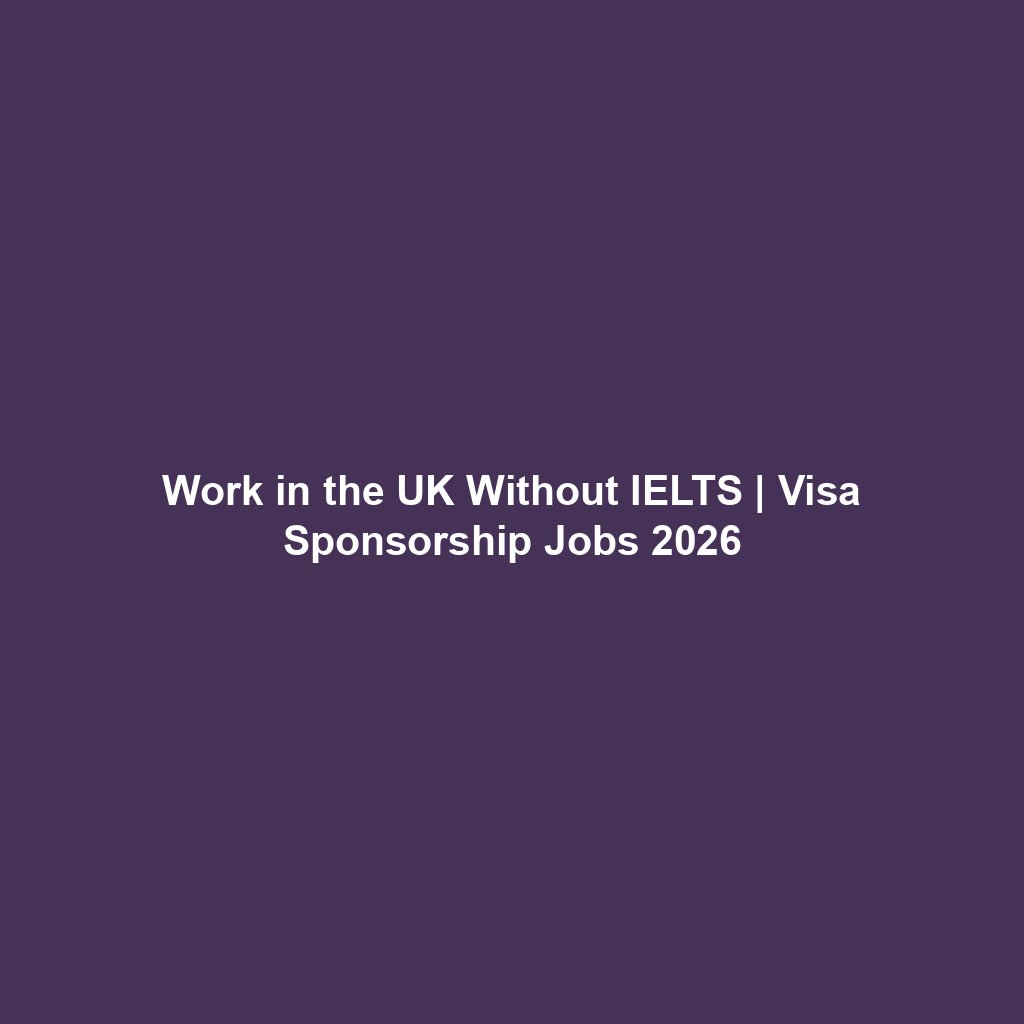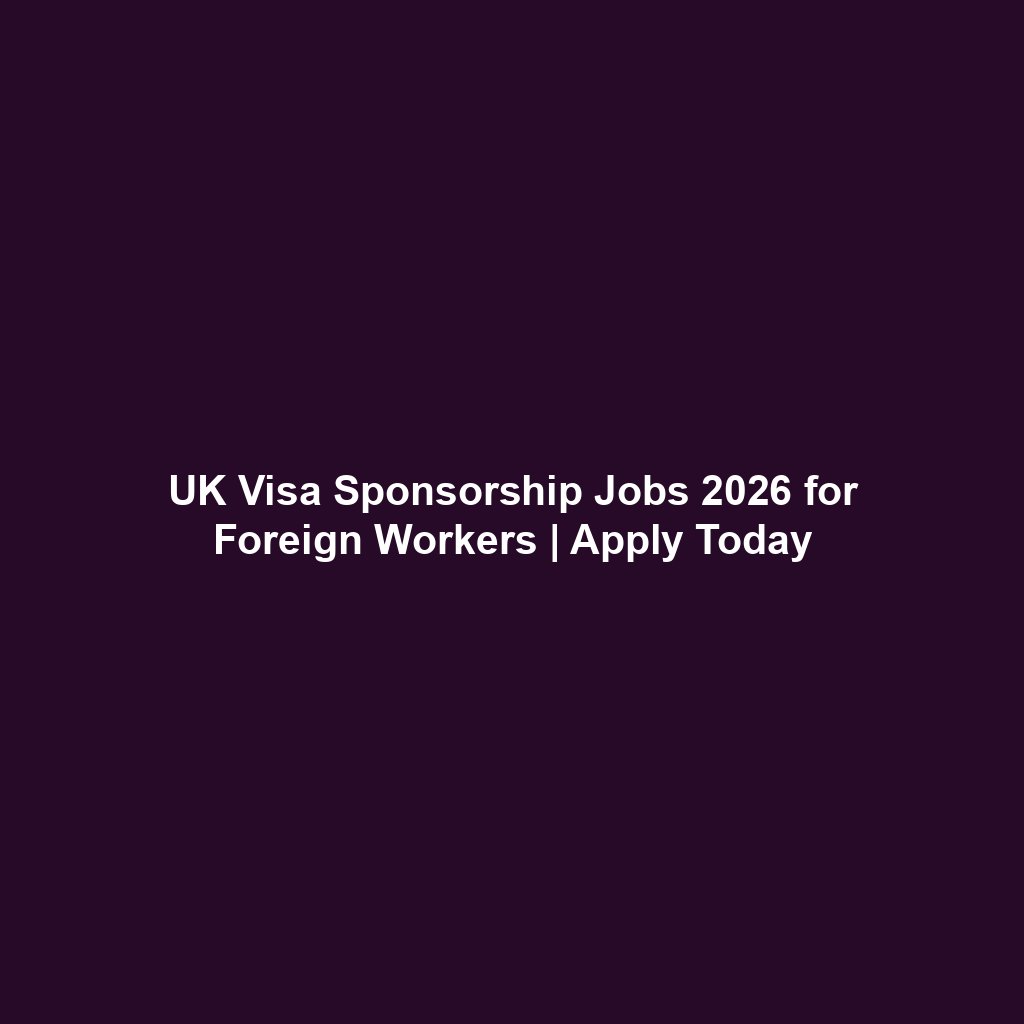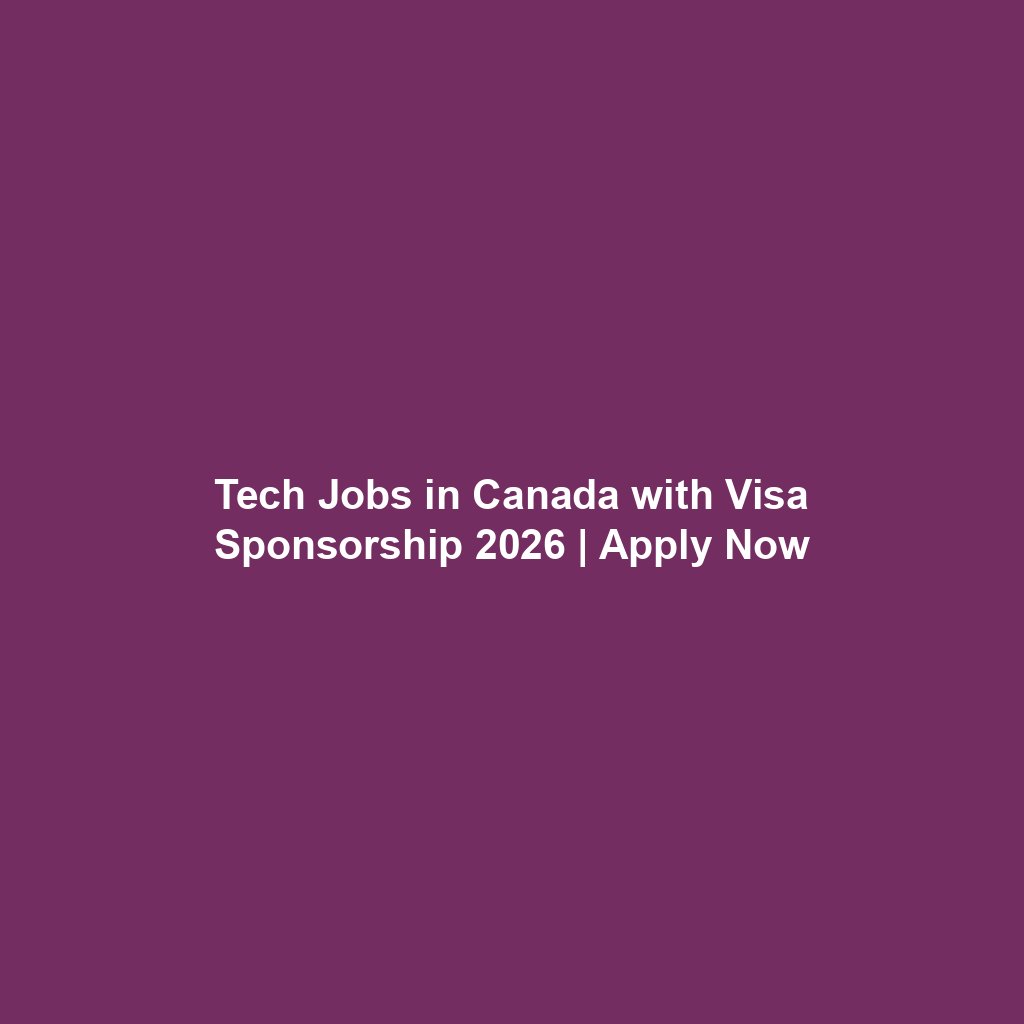Explore top jobs in Canada that provide visa sponsorship and lead to permanent residency (PR) in 2026. Discover industries, eligibility, how to apply, and official immigration links to start your journey.
Every year, thousands of immigrants move to Canada in search of a better life—and for good reason. Canada is not only one of the most immigrant-friendly countries in the world, but it also provides clear, structured pathways to permanent residency (PR) for foreign workers through visa sponsorship programs.
If your goal is to live and work in Canada in 2026 with the hope of becoming a permanent resident, you’re in the right place. Whether you’re a skilled professional, a tradesperson, or even an unskilled worker, many Canadian employers are offering visa sponsorship jobs that can eventually lead to PR status.
In this comprehensive guide, we’ll explore the top job categories in Canada that offer visa sponsorship and PR opportunities, break down the application process, highlight key programs like the Provincial Nominee Program (PNP) and Express Entry, and show you how to maximize your chances in 2026.
Key Highlights
- 🇨🇦 Certain job sectors in Canada offer direct PR pathways through employer sponsorship.
- 🛠️ High-demand fields include healthcare, IT, construction, agriculture, and trucking.
- 🎯 Programs like PNP, AIP, and RNIP are ideal for foreign workers aiming for PR.
- 📄 No Canadian experience needed for some streams—get sponsored right from abroad.
- 🌍 Opportunities exist across multiple provinces with labor shortages.
Top Jobs in Canada That Offer PR Pathways via Visa Sponsorship (2026)
Below are the top occupations in 2026 with high PR approval rates and active employer sponsorship support.
1. Registered Nurses (RN)
Canada’s healthcare system is constantly understaffed, making nursing one of the most reliable pathways to PR. Nurses are eligible under Express Entry (Federal Skilled Worker Program) and Provincial Nominee Programs (PNPs).
- Average Salary: CAD $65,000 – $100,000/year
- Visa Sponsorship: Frequently available in hospitals and care homes
- PR Pathways: FSWP, PNPs, Atlantic Immigration Program (AIP)
📍 Official site: Nursing Jobs in Canada – Job Bank
2. Software Developers & IT Specialists
Tech workers are in high demand in cities like Toronto, Vancouver, and Montreal. Employers often support visa applications and nominate tech workers for PR through Tech Pilot programs.
- Average Salary: CAD $75,000 – $120,000/year
- Visa Sponsorship: Yes, especially with LMIA-approved companies
- PR Pathways: Express Entry (CEC, FSWP), Ontario Tech PNP
📍 Learn more at Global Talent Stream
3. Truck Drivers
Canada’s supply chain relies heavily on foreign truck drivers. Many trucking companies are LMIA-approved and provide visa sponsorship, which qualifies for PR after some work experience.
- Average Salary: CAD $45,000 – $70,000/year
- Visa Sponsorship: Yes (especially in Alberta, Saskatchewan, Nova Scotia)
- PR Pathways: PNPs, AIP, Rural and Northern Immigration Pilot (RNIP)
📍 Search trucking jobs on Canada Job Bank
4. Industrial Butchers and Food Processing Workers
Meat processing plants, especially in Alberta and Manitoba, are facing labor shortages. They actively recruit foreign workers, offer LMIA, and support PR applications.
- Average Salary: CAD $35,000 – $48,000/year
- Visa Sponsorship: Frequently offered under TFWP
- PR Pathways: AIP, PNPs
📍 Official resource: Canadian Meat Council
5. Construction Workers and Carpenters
Canada’s growing infrastructure projects have opened doors for international construction workers. Roles include general labor, carpentry, roofing, and concrete finishing.
- Average Salary: CAD $40,000 – $70,000/year
- Visa Sponsorship: Available through large contracting firms
- PR Pathways: PNPs, RNIP, Express Entry (for skilled trades)
📍 Visit: BuildForce Canada
6. Early Childhood Educators (ECEs)
Daycare centers and private schools across provinces such as British Columbia and Nova Scotia are hiring ECEs from abroad. The occupation is listed as high-priority in many PNPs.
- Average Salary: CAD $38,000 – $60,000/year
- Visa Sponsorship: Often provided by education centers
- PR Pathways: PNPs (especially BC and Nova Scotia)
📍 Learn more at Education Jobs – Job Bank Canada
7. Welders and Electricians
Skilled trades are highly respected and well-paid in Canada. These workers are eligible for Express Entry under the Federal Skilled Trades Program (FSTP) and often sponsored by unions or companies.
- Average Salary: CAD $50,000 – $80,000/year
- Visa Sponsorship: Yes, particularly in Northern and Western Canada
- PR Pathways: FSTP, PNPs, RNIP
8. Farm Workers and Agricultural Laborers
Agriculture continues to offer abundant visa-sponsored positions, especially during peak seasons. Many PR streams support these roles in rural provinces.
- Average Salary: CAD $30,000 – $42,000/year
- Visa Sponsorship: Yes (through Seasonal Agricultural Worker Program – SAWP)
- PR Pathways: AIP, RNIP, Agri-Food Immigration Pilot
📍 Apply through: Agriculture Job Bank Canada
9. Caregivers (Home Support Workers)
Canada’s ageing population has increased the need for home support workers and caregivers. Approved employers can sponsor foreign caregivers directly, with a clear pathway to PR after 2 years of work.
- Average Salary: CAD $32,000 – $48,000/year
- Visa Sponsorship: Yes (under Caregiver Pilot)
- PR Pathways: Home Support Worker Pilot, PNPs
📍 Official site: Caregiver Immigration Program – IRCC
10. Hospitality & Food Service Supervisors
Hotel and restaurant chains, especially in tourist-heavy provinces like Alberta and BC, regularly sponsor food service workers for work permits and PR.
- Average Salary: CAD $35,000 – $50,000/year
- Visa Sponsorship: Yes (under LMIA and PNP pathways)
- PR Pathways: PNPs (especially Alberta and Atlantic provinces)
How to Apply for These Jobs and PR Pathways in 2026
1. Search for LMIA-Approved Jobs
Focus on employers already approved to hire foreign workers through an LMIA. Use job boards and filters:
2. Tailor Your Resume to Canadian Standards
Canadian employers prefer a clean, 1–2-page resume focusing on:
- Work experience
- Soft skills
- Certifications and licenses
- References (if available)
3. Get a Valid Job Offer
Once hired, your employer will provide a formal job offer letter and may begin the LMIA process. This is a key requirement to apply for a work permit.
4. Apply for a Work Permit
After receiving an LMIA (or if exempt), apply for your Canadian work permit online through the IRCC portal.
📍 Apply here: IRCC Work Permit Application
5. Apply for PR Through the Right Program
Depending on your job and location, choose the correct PR stream:
- Express Entry (FSWP, FSTP, CEC)
- Provincial Nominee Programs (PNPs)
- Atlantic Immigration Program (AIP)
- Rural and Northern Immigration Pilot (RNIP)
- Agri-Food Pilot
- Caregiver Pilot
Most of these require at least one year of Canadian work experience, a valid job offer, and proof of funds.
Conclusion
Landing a job in Canada that offers visa sponsorship and a PR pathway is not just a dream—it’s a real possibility in 2026. Whether you’re a healthcare professional, tech expert, tradesperson, or agricultural worker, there are clear, well-structured routes to becoming a Canadian permanent resident.
Employers are actively seeking foreign talent, and immigration programs have been optimized to fill critical labor shortages. With the right information, preparation, and persistence, you could be living and working in Canada within months—on a path to PR.
👉 Now is the best time to start. Apply today and take the first step toward your Canadian dream.
FAQs
1. Do I need a Canadian job offer to get PR?
Not always. While Express Entry doesn’t require a job offer, having one with an LMIA can significantly boost your chances or qualify you for PNPs.
2. Can unskilled workers apply for PR in Canada?
Yes, through programs like the Agri-Food Pilot, Caregiver Pilot, and certain PNPs tailored to unskilled roles.
3. How long does it take to get PR after working in Canada?
It depends on the program. Most require 1–2 years of work experience in Canada before applying.
4. Is IELTS mandatory for PR applications?
Yes, you must prove language proficiency (English or French). Minimum CLB scores vary by program.
5. Can I apply for a PR from outside Canada?
Yes. Many PR streams like the Federal Skilled Worker Program allow you to apply from abroad if you meet the eligibility.




